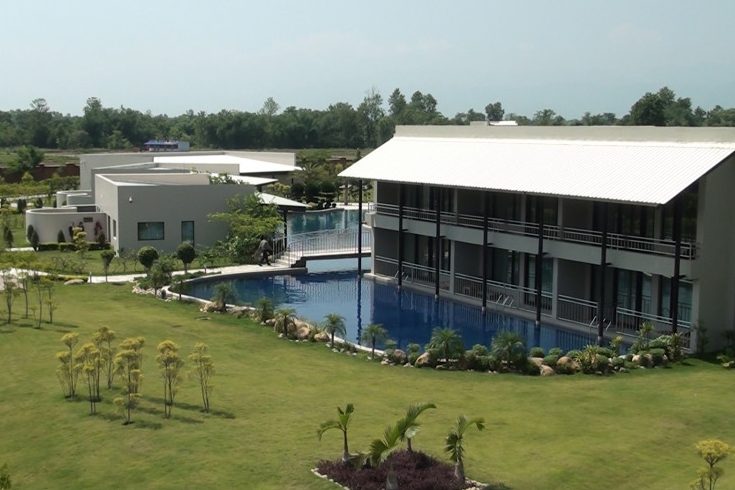Tiger Palace Casino Resort in Bhairahawa has laid off all its 393 Nepali employees due to financial distress as the virus lockdown brought tourism to a halt.
On March 23, the Silver Heritage Group, the Australian-listed gaming investor which operates two casinos in Nepal, had announced a temporary closure of its two properties—Tiger Place Resort and The Millionaires’ Club & Casino in Kathmandu.
Two weeks ago, the Silver Heritage Group emailed all Tiger Palace Resort employees informing them that it was unable to renew the agreement as their two-year terms ended on September 9.
“Following the conclusion of our initial two-year business plan and pursuant to clause 4 of the contract, the company hereby notifies you that your employment contract will not be renewed for a further period. We thank you for your efforts in completing the contract requirements,” Mike Bolsover, managing director of the Silver Heritage Group, said in the letter, a copy of which was obtained by the Post.
The letter continues: “The global coronavirus pandemic is an unprecedented event that has left the business mandatorily shuttered since March 2020. With no revenue since this time, the company is faced with several financial hardships and an inability to reopen unless action is taken to reduce cost and become more efficient.”
The company said that during the lockdown, unlike most other businesses in Nepal, it continued to pay 50 percent of the gross salary as a gesture of goodwill.
“The company requests you to contact the finance department for your final settlement.” The company said it hoped to reopen soon and begin the next two-year phase, and urged the employees to stay in touch regarding suitable vacancies in the future.
Indra Bhattarai, human resource manager at the company, said all employees had been served the layoff notice. “The senior teams are in Hong Kong and Australia. We are not in contact with them.”
Around half of the employees at the resort have launched a protest claiming that it was a unilateral decision and against Nepal’s labour laws. Nepali employees also charged that the company did not discharge foreign workers.
“Some of the foreign staffers, whose visas have expired, have not been laid off yet,” said Bishal Karki, an employee. “They are paid more than Rs500,000 monthly,” he said. “It’s a discriminatory policy to terminate Nepali workers only.”
Chitra Bhandari, who has been leading the protest, said the decision to lay off workers was made unilaterally by the company. “Without prior information, we have been given a surprise termination letter by email.”
He said that based on labour laws, the company cannot lay off workers who have served for more than two years. “That’s why we have been forced to launch the agitation.”
Nearly 200 workers are protesting against the company demanding their immediate reinstatement.
Basu Dev Ghimire, mayor of Tilottama Municipality, said that they would find some solution to the problem without causing any negative impact on foreign investors. “As the resort has been operated under the foreign direct investment policy and has foreign management, the municipality does not have any crucial role to deal with the issue, but we can play a facilitating role to settle the issue.”
An official of the Silver Heritage Group told the Post that they were trying to save the company and the investment. “We are, as ever, guided by and acting in accordance with the laws of Nepal. These are unprecedented times,” the official said in an unofficial conversation with the Post.
The Silver Heritage Group debuted in Nepal in 2015 with the opening of The Millionaire’s Club & Casino at the Shangri-La Hotel in Kathmandu. The group has planned a phased investment of more than $150 million to develop a chain of five-star properties across Nepal.
In the first phase, the 100-room property, which is the first integrated five-star casino resort in South Asia, was developed by the company. It was awarded a five-star rating by the Department of Tourism in November 2017, and came into operation in the first quarter of 2018, well behind its operation deadline that cost the company an additional $12 million to complete the project.
The cost overrun increased the project’s price tag to $60 million, and the company counted on its other casino, the Phoenix International Club in Vietnam, to provide support. Silver Heritage was managing the property’s gaming operations at the time; however, the venue lost its gaming tables licence in 2019, dealing Silver Heritage a huge blow.
Nepal’s operations haven’t been able to close the gap completely, and failure to generate adequate funds even prompted the company to sell its Nepal property. Covid-19 came as another setback for the company.
https://kathmandupost.com/money/2020/09/18/tiger-palace-casino-resort-lays-off-393-employees
